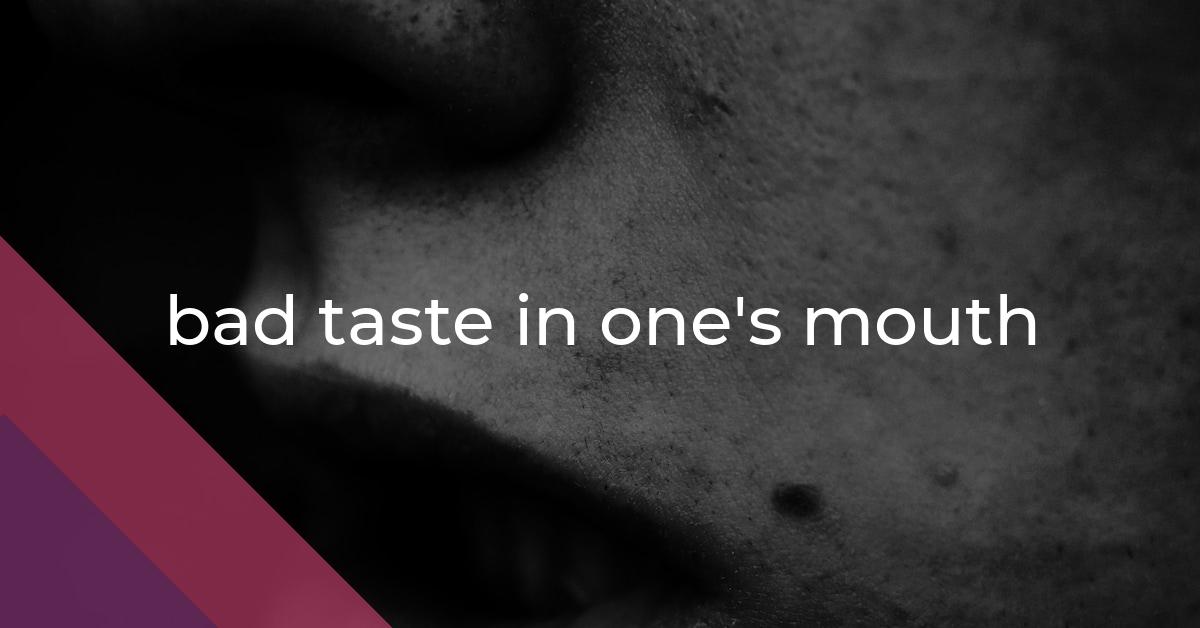bad taste in one’s mouth: Idiom Meaning and Origin
What does ‘bad taste in one's mouth’ mean?
"Bad taste in one's mouth" means to have a negative feeling or impression about something or someone.

Idiom Explorer
"Lie ill in one's mouth" means that something, usually food or drink, tastes unpleasant or causes discomfort when consumed.
The idiom "eat shit" is an offensive expression used to imply contempt, frustration, or disbelief towards someone or a situation, often indicating a desire for them to fail or suffer negative consequences.
The idiom "down the toilet" means that something has been wasted or lost in a negative or unsuccessful way.
"Down in the mouth" means feeling sad or depressed, often shown by a downward-turned mouth. It implies a downturn in one's mood or emotional state.
The idiom "do down" means to criticize or speak negatively about someone or something.
The idiom "dirty word" refers to a word or phrase that is offensive, vulgar, or taboo in nature. It is generally used to describe language that is considered inappropriate or socially unacceptable in certain contexts.
A dirty look is a facial expression that conveys anger, disapproval, or contempt towards someone or something. It can be a nonverbal way of expressing negative emotions and can be perceived as hostile or intimidating.
The idiom "diarrhea of the mouth" refers to someone who talks excessively and often without thinking, spouting out words uncontrollably and without any filter.
The idiom "can't stand the sight of" means to have a strong dislike or aversion towards someone or something, often to the point of being unable to tolerate their presence or even looking at them.
Unmasking Origins
The idiom "bad taste in one's mouth" is a commonly used expression in spoken and written English. It refers to a negative or unpleasant feeling or experience that persists, much like the literal sensation of an unpleasant taste. The origin and etymology of this idiom are uncertain, but its meaning and usage are well-established.
When someone says they have a "bad taste in their mouth," they are using a metaphor to describe a situation or event that has left a negative impression or feeling. This idiomatic expression is often employed to depict a disappointing, offensive, or distasteful experience that continues to affect someone even after it has transpired.
The exact origins of this idiom remain unclear, lacking definitive sources tracing its history. Nevertheless, it likely derives from the figurative understanding of the physical sensation of having a bad taste in one's mouth. Just as an unpleasant taste can linger longer than desired after eating or drinking something, a negative experience can leave a lasting impact on a person's thoughts and emotions.
This idiom is widely used in various contexts. For instance, it can be employed when discussing an unsatisfactory meal, a distasteful conversation, or a negative outcome in a particular situation. Additionally, it may be used metaphorically to depict an unpleasant feeling or lingering disappointment related to a person or event.
The phrase "bad taste in one's mouth" is idiomatic and is understood as a metaphorical expression by native English speakers. While it can be interpreted quite literally, its figurative meaning is well-established and widely recognized.
One related idiom is "all one's taste is in one's mouth." This expression conveys a sense of disappointment or dissatisfaction when all one's experiences or choices turn out poorly. It suggests that one's ability to discern or appreciate pleasant experiences is limited, as if the entirety of one's sense of taste is confined to their mouth.
Another related idiom is "lie ill in one's mouth." This phrase describes something that one finds so offensive or distasteful that the mere thought or mention of it evokes a physical sensation of illness or discomfort in one's mouth. It emphasizes the strong negative reaction and aversion one has towards the subject.
Similarly, the idiom "down in the mouth" is related to the expression "bad taste in one's mouth." It shares the theme of dissatisfaction or disappointment. "Down in the mouth" refers to feeling unhappy, discouraged, or dejected, often as a result of unfavorable circumstances or unmet expectations. This idiom suggests a visible and palpable expression of these negative emotions.
The expression "can't stand" is another idiom connected to the idea of "bad taste in one's mouth." When someone says they "can't stand" something or someone, they imply a strong aversion or intolerance towards it. This idiom evokes the sensation of an unpleasant taste that is so overwhelming that one cannot endure or tolerate it.
Lastly, the idiom "cat piss" is also related to the expression "bad taste in one's mouth." It is used to describe something that is extremely unpleasant or offensive. This idiom draws on the association of the scent or taste of cat urine as something highly repulsive and disgusting. It serves as a colorful and vivid way to depict a negative experience or feeling.
The idiom "bad taste in one's mouth" is a metaphorical expression describing a negative or unpleasant feeling or experience that endures. Although its exact origins are uncertain, native English speakers understand its figurative meaning. Whether used to describe a disappointing meal or an unsatisfactory outcome in a situation, this idiom conveys a sense of lingering dissatisfaction or disappointment. The related idioms, such as "all one's taste is in one's mouth," "lie ill in one's mouth," "down in the mouth," "can't stand," and "cat piss," further deepen the understanding and usage of the idiom "bad taste in one's mouth" by providing additional nuances and perspectives.
Example usage
Examples of how the idiom bad taste in one's mouth can be used in a sentence:
- After watching the horror movie, he had a bad taste in his mouth and couldn't sleep.
- The politician's dishonesty left a bad taste in the voters' mouths, resulting in a loss of support.
- She regretted her hurtful comments as soon as they left her mouth, and they left a bad taste in her mouth.
More "Euphemisms" idioms



